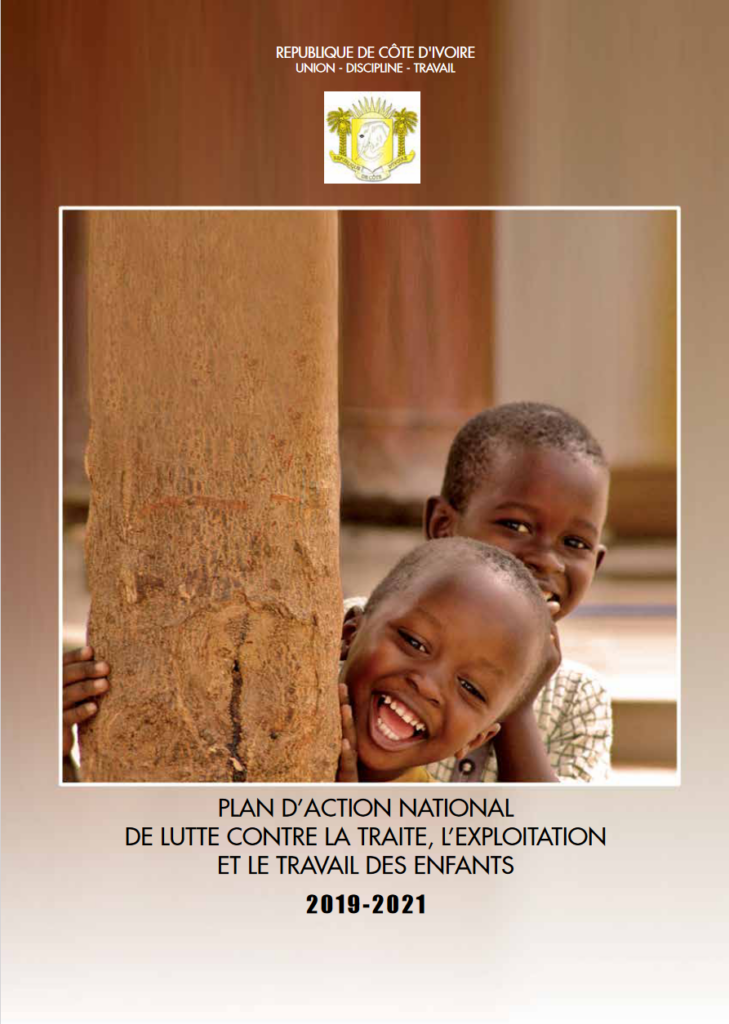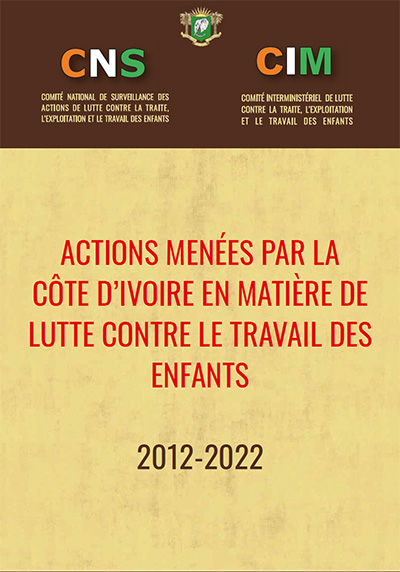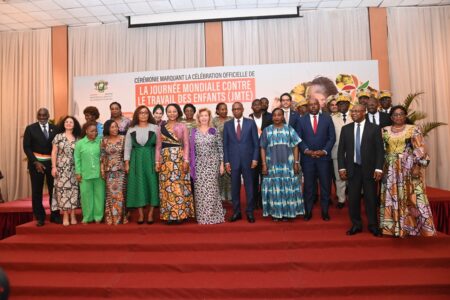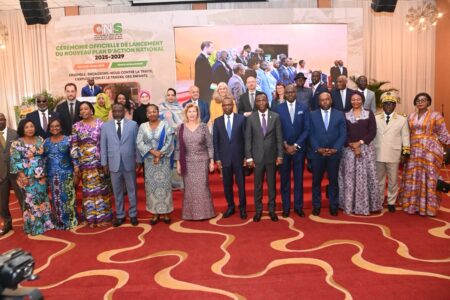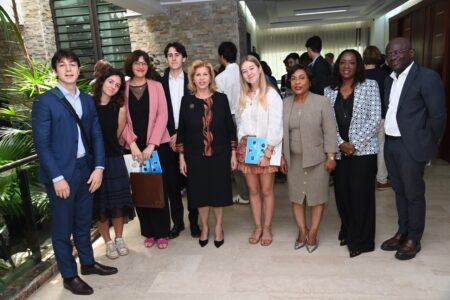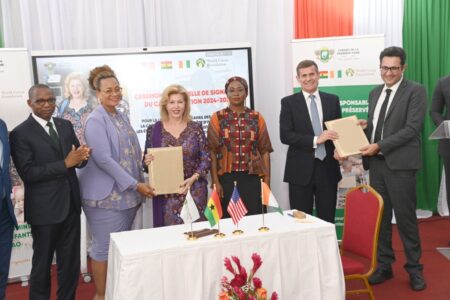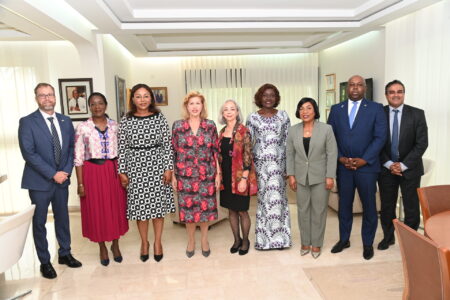Combatting child labor
The National Oversight Committee of Actions for the Fight against Trafficking, Exploitation and Child Labor (CNS)
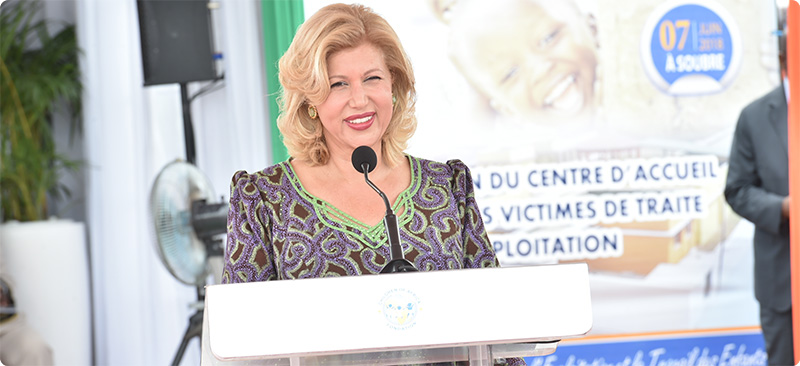
1. About CNS
- Inception date and composition of the CNS
The CNS was created by Decree nº2011-366 of November 03, 2011, with the aim of providing a response to the issue of child labor in Côte d’Ivoire. It is chaired by the First Lady of Côte d’Ivoire, Mrs Dominique Ouattara, President of the Children Of Africa Foundation. The CNS has a permanent Executive Secretariat headed by the First Lady’s Chief of Staff. The CNS has national competence in all sectors of economic activity.
The CNS includes United Nations organizations, civil society organizations (national and international NGOs), coffee and cocoa industry organizations, professional employers’ organizations and workers’ organizations working in the field of child protection. The following organizations are currently members of the CNS:
- The Coffee and Cocoa Council
- United Nations Children’s Fund (UNICEF)
- International Labor Organization (ILO)
- International Organization for Migration (IOM)
- International Cocoa Initiative (ICI)
- World Cocoa Foundation (WCF)
- International Rescue Committee (IRC)
- Save The Children International
- Care International
- Children Of Africa Foundation (COA)
- Exporters Association (GEPEX)
- Ivorian Traders Association (GNI)
- The Cooperative Society of Cocoa Producers SCINPA
- General Confederation of Businesses (CGECI)
- Ivorian Workers Union (UGTCI)
- National Forum of NGOs and Associations for Children in Need
- NGO Fraternity withour Limit (FSL)
- NGO Children’s Rights and Dignity (DDE-CI)
- CNS missions
The main missions of the CNS are to monitor and evaluate government’s actions
to combat trafficking, exploitation and child labor. As such, it is responsible for :
- Monitoring the implementation of government projects and programs to combat child trafficking, exploitation and child labor;
- Supervising the application of conventions to combat trafficking, exploitation and child labor;
- Take preventive actions against child trafficking, exploitation and child labor.
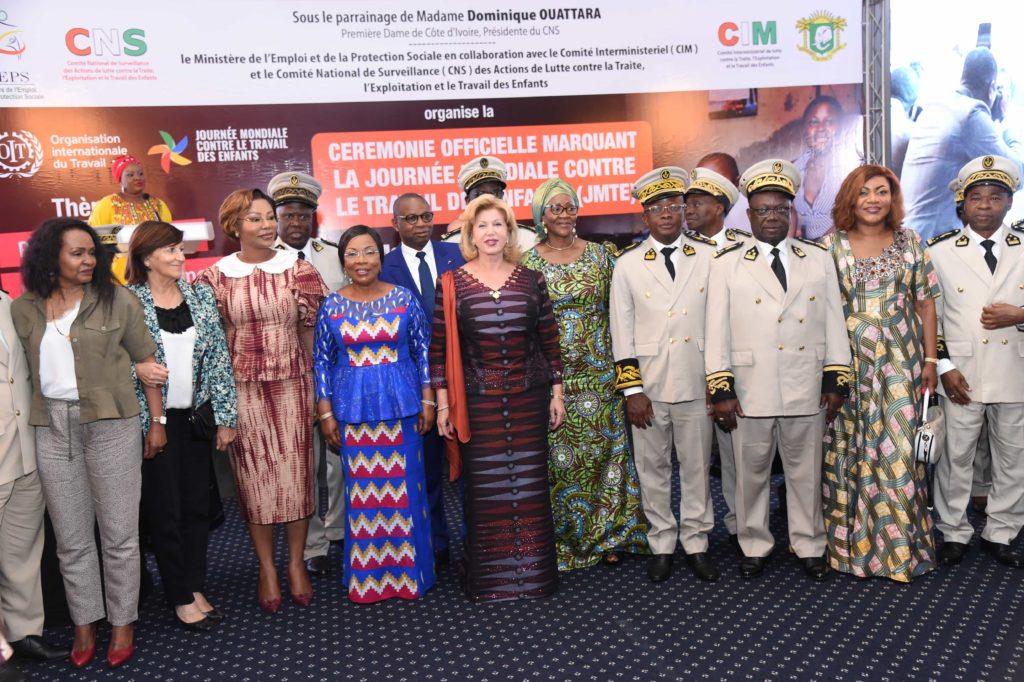
2. CNS strategy to combat child labor
To combat child labor, the CNS has drawn up three National Action Plans (PAN), with the participation of government bodies, national and international partners involved in the fight against child labor. The first NAP was implemented from 2012 to 2014, the second from 2015 to 2017 and the third from 2019 to 2023. A new National Action Plan will be launched in 2024.
The NAP is the national strategy document that explains Côte d’Ivoire’s objectives in the fight against child labor. As such, it organizes the national response against child labor around four strategic axes, there are:
- Prevention of the phenomenon ;
- Protection of children and assistance to victims;
- Prosecution and repression of child traffickers;
- Coordination and monitoring-evaluation of initiatives at national level.
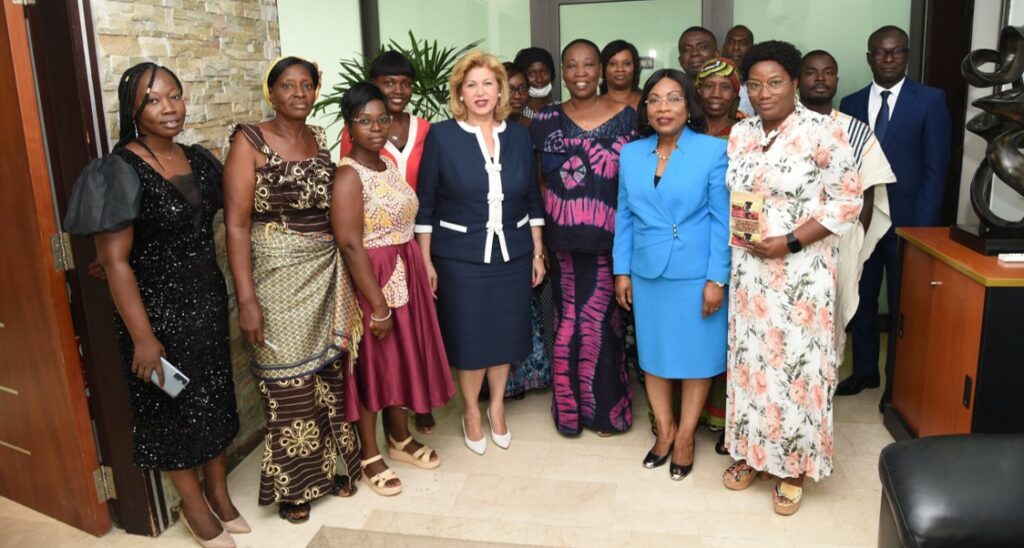
3. CNS activities
To combat child labor, the CNS carries out a variety of activities at both national and international level.
3.1. At national level
3.1.1. In the field of Prevention
- Awareness-raising and communication campaigns to inform the public about hazardous work prohibited to children, and light work or socializing activities authorized for them by international conventions and national legislation.
- Training national players in prevention, detection and victim care techniques.
- Copy and dissemination of legislative and regulatory texts prohibiting child labor.
- The creation of child protection committees throughout the country.
- Production of awareness-raising and communication materials against child labor.
3.1.2. In the field of protection
- Construction of primary and nursery schools, school canteens and teachers’ lodgings in rural areas to facilitate children’s access to education.
- Distribution of school kits and textbooks to pupils from low-income families.
Support for the establishment of supplementary judgments for children not registered with the civil registry.
- Strengthening the economic capacities of vulnerable families by granting microloan for income-generating activities (IGAs) and setting up village savings and loan associations (VSLAs).
3.1.3. In the field of law enforcement
- Providing support for the creation and equipping in 2020 (decree n°0197/MSPC/CAB of 18th June 2020), of 6 regional branches of the Police unit in charge of the fight against child trafficking and juvenile delinquency (SDLTEEDJ), in Man, San Pedro, Soubre, Bouake, Korhogo and Bondoukou, in addition to the Central Office in Abidjan, for local monitoring of child labor. From January 2012 to December 2023, the SDLTEEDJ carried out a number of activities that helped 18,000 victims, including 15,000 child victims of trafficking, exploitation and child labor, 2,300 child victims of trafficking for sexual exploitation and 700 child victims of trafficking for exploitation through beggin
- Providing support for police operations against trafficking, exploitation and child labor in high-risk areas. The SDLTEEDJ had carried out 06 major police operations: BIA 1, BIA 2 and BIA 3 in the Aboisso area, NAWA 1 and NAWA 2 in the Soubre region and operation AKOMA in the San Pedro region. In all, between 2012 and 2023, the SDLTEEDJ arrested 5,500 people and brought them to court.
- Providing support for strengthening Police and Gendarmerie interventions on the ground.
3.1.4. In the field of coordination and monitoring-evaluation
- Field visits to supervise and monitor projects to combat child labor, with a view to aligning them with national priorities.
- The organization of periodic coordination and monitoring-evaluation meetings on the implementation of the National Action Plan to Combat Child Trafficking, Exploitation and Labor.
- Ongoing monitoring of child labor in the cocoa supply chain, through the recruitment of Child Labor Verification Agents, in collaboration with the Conseil du Café-Cacao.
- Signing of partnership agreements with companies and organizations in the private sector, with a view to pooling efforts.
3.2. At international level
- The signing of cooperation agreements with border countries (Ghana, Burkina Faso, Mali, etc.), to combat cross-border child trafficking upstream.
- The organization in 2017 in Abidjan by the First Lady, Mrs Dominique Ouattara, of the conference of First Ladies of West Africa and the Sahel on joint actions to combat cross-border child trafficking.
- Advocacy by the First Lady, Mrs Dominique Ouattara, with leading foreign figures in Europe and the United States, to present Côte d’Ivoire’s efforts to combat child labor.
- Participation in high-level international meetings on the issues and challenges in combating child labor.
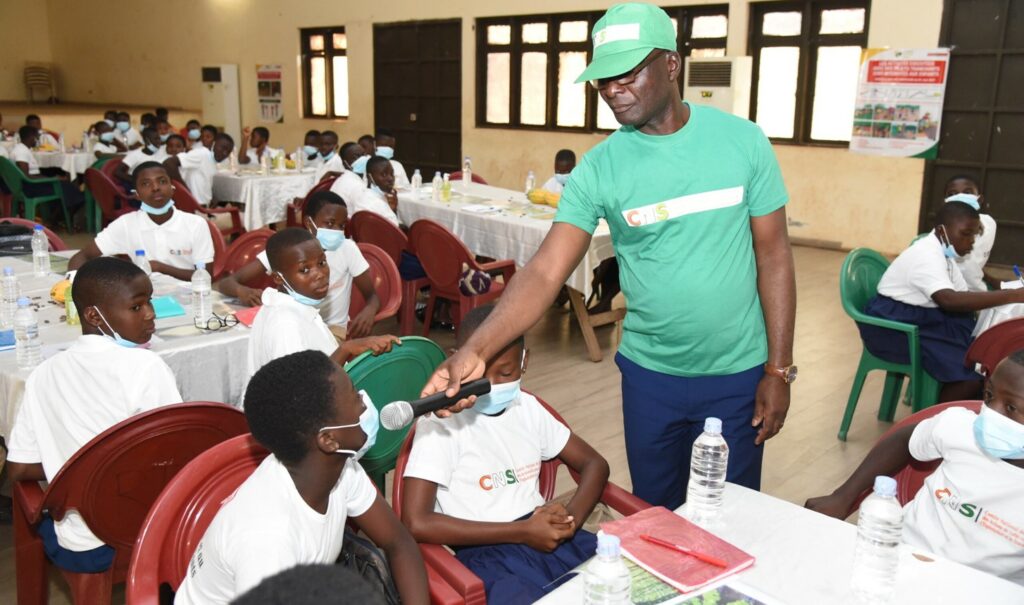
4. Main results
4.1. At national level: steady decline in the prevalence of child labor
- Since 2012, the national child labor prevalence rate has been falling. Indeed, it has fallen from 39% in 2012, to 3% in 2016 and to 21.6% in 2021, compare to data from the Multiple Indicator Cluster Surveys (MICS 2012 and 2016), and the Côte d’Ivoire Demographic and Health Survey 2021 (EDS-CI 2021).
- In the specific cocoa sector, according to the University of Chicago NORC study, carried out in 2019 with funding from the World Cocoa Foundation (WCF), the decline in the prevalence rate of child labor is around 32% in communities where intensive remediation actions have been carried out, compared with similar communities in which programs to combat child labor have not yet been carried out.
4.2. International recognition by assessment bodies of Côte d’Ivoire’s efforts
At international level, these results earned Côte d’Ivoire a ranking in 2022 as one of the top four countries out of a total of 131 evaluated, with the highest score for “significant progress”, according to the United States Department of Labor’s 2022 report on the evaluation of States’ efforts to combat child labor. The same report indicates that Côte d’Ivoire is the only country on the African continent to have achieved this top-4 ranking.
The US Department of Labor’s annual report on child labor classifies countries into 5 categories. The first category comprises countries making significant progress in the fight against child labor, the second category comprises countries making moderate progress, the third category comprises countries making minimal progress, the fourth category comprises countries making no progress, and the fifth category comprises unranked countries.
Since 2012, Côte d’Ivoire has regularly been ranked in the first category of significant progress.
Concerning the fight against human trafficking, Côte d’Ivoire was ranked in 2022 by the US State Department, in tier 2 of the scale assessing countries’ efforts to combat human trafficking. This ranking corresponds to countries that meet the minimum standards and are making significant efforts to combat human trafficking. The ranking is based on a scale of values from 1 to 4, we have tier 1, tier 2 for countries under surveillance, and tier 3.
It should be recalled that in 2010, Côte d’Ivoire was classified in tier 2 under surveillance and was due to regress in 2011 to tier 3, where it would be subject to US government sanctions, such as the embargo on Ivorian cocoa. But thanks to the personal commitment and determination of the First Lady, Mrs Dominique Ouattara, in the fight against child labor, Côte d’Ivoire has been reclassified in tier 2 several years in a row since 2012.
This regressive trend provides proof that the intensive awareness-raising and remedial actions carried out since 2012 by the National Oversight Committee of Actions for the Fight against Child Trafficking, Exploitation and Labor (CNS), headed by Mrs Dominique Ouattara, First Lady of Côte d’Ivoire, in collaboration with its national and international, bilateral and multilateral partners, are having a real impact on reducing the phenomenon on a national scale.
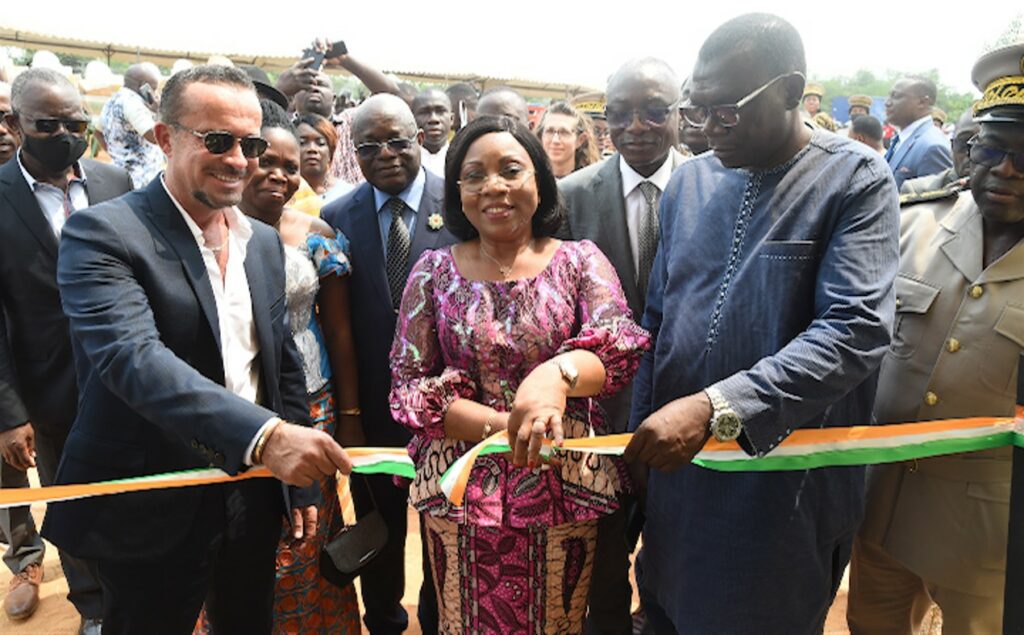
5. The main challenges
There are a number of challenges, including :
- Getting all school-age children into school and keeping them there.
- Vocational training and decent work for young people of working age.
- Traceability of raw material supply chains, especially cocoa.
- Combating household poverty and improving living conditions in rural communities.
- Combating cross-border child trafficking and migrant smuggling.
- Transition from the informal to the formal sector.
Découvrez les actions du CNS
Actions de Lutte contre la Traite,
l’Exploitation et le travail des
Enfants

